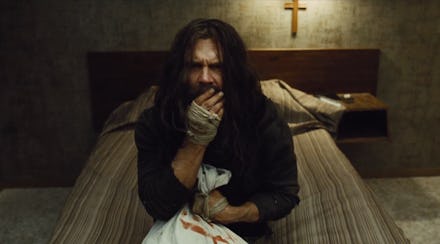Spike Lee's Films Aren't About Racist Characters, They're About Flawed People

There's a Family Guy joke where Peter Griffin tells his wife, Lois, "brothers and sisters fighting is as natural as a white man's dialogue in a Spike Lee movie." The scene then cuts to a snippet of what is presumably a scene in a Lee film where a black man approaches a pizzeria counter. "What's up?" he says, "Can I get two slices of pepperoni?" The white proprietor snaps back with a series of growls and roars, frothing at the mouth and clawing the air menacingly.
The sequence captures what many people think about Lee and his movies — especially his attitude towards white people. He might be the most famous black filmmaker ever, but he's earned consistent backlash for exploring what many consider "controversial" themes: gentrification, interracial romance, black-on-black bigotry, and Steve Harvey's haircut. I even Googled the phrase "Spike Lee is," and "racist" was the top suggestion. With a quarter-century of films under his belt, the filmmaker has had ample opportunity to address these allegations in his work. In a way, his new movie Oldboy is the culmination of that conversation. After all, it's his third film of over 30 to feature a white male protagonist.
I should clarify that I doubt Lee actually cares whether people think he's racist. I also doubt that any of his work is consciously responding to those who characterize him as such. Allegations that he employed ethnic stereotypes in portraying Jewish label execs in Mo' Better Blues, for example, are certainly valid. His artistic intent has been clear since day one. He wants increased black representation in film, and his work stands as a testament to that vision — his many films have featured black characters ranging from architects and activists to deliverymen, frat boys, and soldiers, to name a few. They also often feature racist white characters as a way of exploring race and racism. Welcome to the world we live in.
Of his over 30 films, the only three featuring white main characters are Summer of Sam (1999), 25th Hour (2002), and Oldboy (2013). I approached this piece thinking I'd uncover something fascinating when I re-watched these movies, something about Lee, an outspoken black man, chucking firebombs at standard Hollywood narratives and mythologies surrounding white masculinity. What I found was fascinating, mainly because of how decidedly un-fascinating it was: Lee's white male leads are suspiciously similar to his black male leads.
They, too, are incredibly complicated human beings — Vinny in Summer of Sam is a womanizing hairdresser who yearns to be a good husband. Monty in 25th Hour is a drug dealer navigating his last day of freedom before an impending jail sentence, facing the social and moral dilemmas that come with it. Joe in Oldboy is an asshole and a drunk who endures true suffering and emerges aching to be a better father.
Seeing these men made clear what many of Lee's critics fail to appreciate about his work — race is fundamental to his vision, but equally important is the psychological and moral complexity of the people who inhabit his films. These are neither heroes nor villains. They're deeply flawed people who find themselves in morally challenging situations. Sometimes they make good decisions, and sometimes they make bad ones. They're simultaneously endearing and dislikable, precisely because of how human they are. They remind me of me, and they remind you of you. And they don't exist solely as commentaries on race.
Via Movie Mezzanine.
If anything, Oldboy is Lee's film where discussions about race are the least explicitly pronounced. As a Hollywood remake of an infamous and popular Korean thriller — itself an adaptation of a Japanese manga — the film has even faced the same "whitewashing" accusations as other American translations of Asian films. It's clear that Lee will never be able to make a film without some kind of racial subtext being read into it, whether he intends it or not. I'm sure he's fine with that. He's wanted race to be part of the conversation since day one.
Via Pretty Clever Films.
However, it would be a shame to focus on questions of race in his films at the expense of appreciating his merits as a writer and director. A good movie is a good movie, and Lee has made plenty. Failing to realize this means we're missing much of the point — the man is not a sociologist, an anthropologist, or a critical race theorist.
He's a filmmaker.